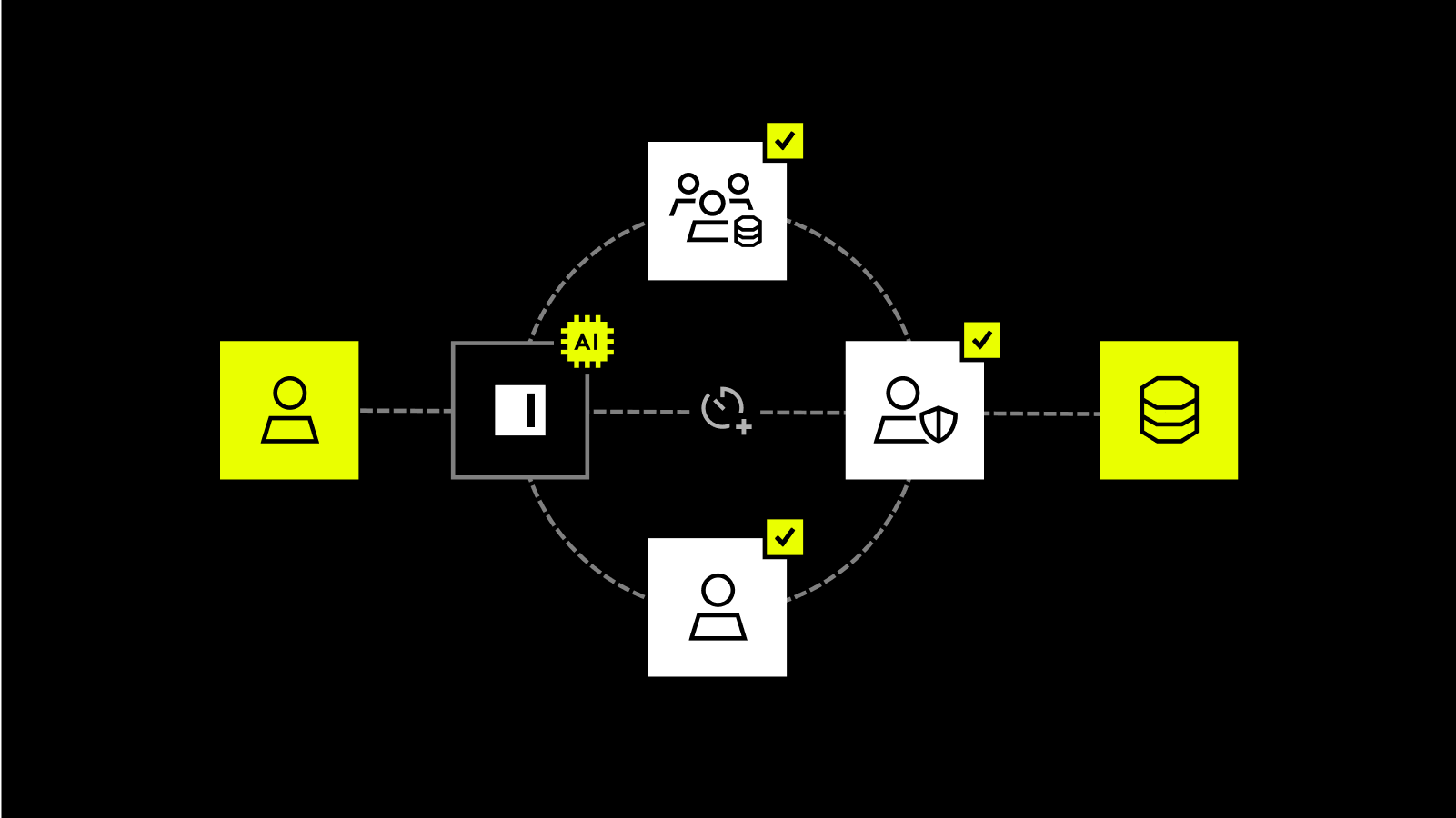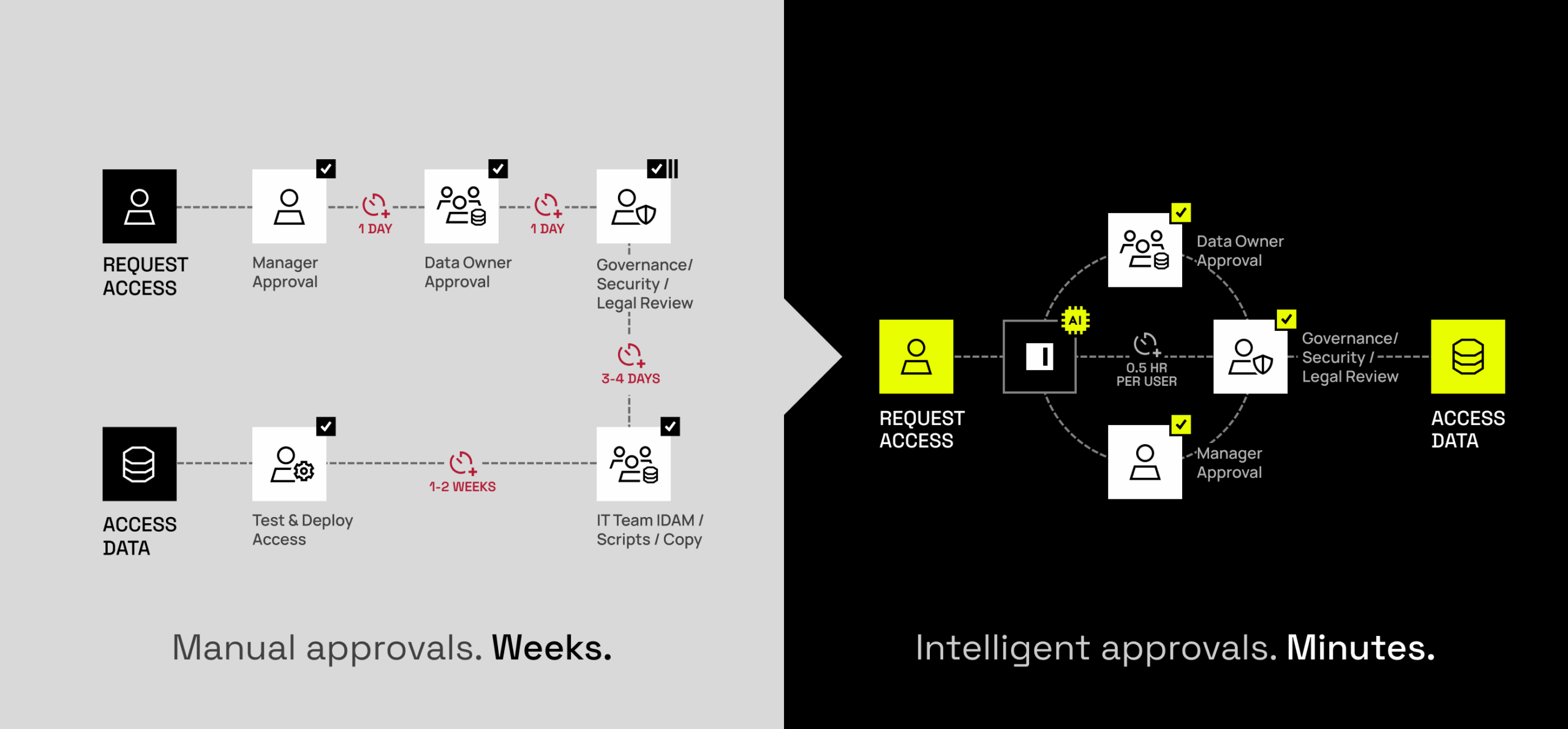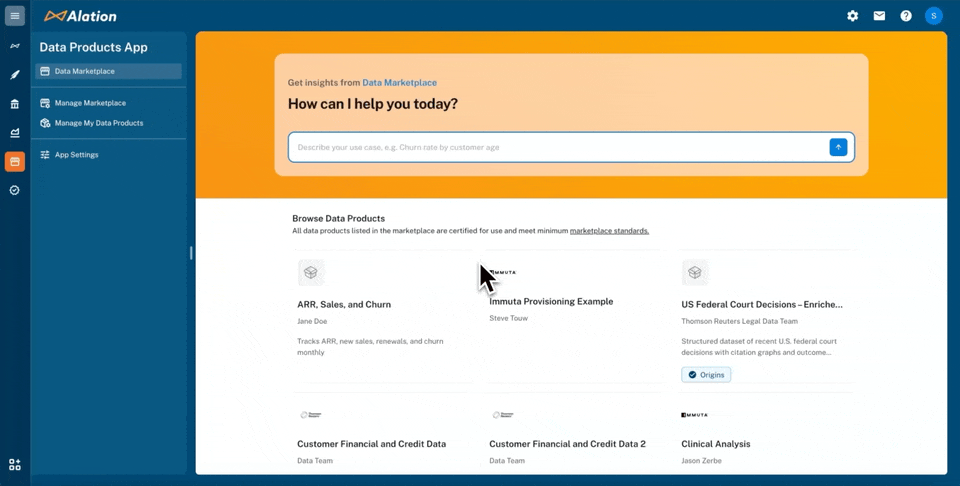
At Immuta, our mission is simple: Make it easy for people to access the data they need — securely and from anywhere. Today, we help some of the world’s biggest companies do exactly that. Whether it’s separating buy and sell-side data in finance, protecting patient identities in drug trials, or controlling classified information in government, our platform handles millions of secure data requests every day for tens of millions of users.
We began this journey in 2018 as the first platform to build security rules ‘natively’ into cloud data platforms like Databricks and Snowflake. Our goal was to give companies precise control over who can access what data — without sacrificing performance. Just as importantly, we built a no-code interface so data governance teams could set policies once and have them enforced automatically (birthright), eliminating manual processes and oversight. In doing so, we empower small governance teams to operate with the efficiency and scale of large engineering groups.
Data access is changing – and existing systems are breaking
Over the past year, we’ve completely reimagined how data access works. With the rise of generative AI, every employee — not just analysts or engineers — can now tap into data. Practically overnight, the number of data consumers has grown from a few thousand specialists to the entire organization.
That surge has created an impossible challenge: data governance teams can’t write and maintain rules for every edge case. The only way to keep access secure and scalable is through decentralization — setting broad guardrails (attribute-based access control with native policies) while letting business domains manage exceptions through data access request workflows, effectively crowdsourcing data policy as usage expands.
But traditional ticketing systems can’t handle this new reality. Most enterprises still funnel access requests through tickets, but the model collapses under scale. Data governance teams are drowning in hundreds or thousands of requests, and each one can take two or three weeks end-to-end before access is granted. A single ticket might:
- Consume two to four hours from an approver
- Take another eight to 16 hours from IT
- Bounce through a maze of managers, governance, legal, security, and finally IT engineers, who write scripts and push updates into identity systems
Multiply that across a large enterprise, where anywhere from 20,000 to 200,000 tickets are raised every year — and factor in AI agents generating requests at 10x that rate — and the inefficiency becomes staggering.
What does the future of data access look like?
To solve this, we’ve reset our strategy around three pillars for the future of data access:
- Connect all data: Control access across all your data, wherever it lives.
- Meet data consumers where they work: Request access directly from the tools you already use.
- Use GenAI to speed things up: Cut approvals from weeks to hours.
In making this shift, Immuta has evolved from a pure policy enforcement platform to a data provisioning workflow company.
Our mission now is to make requesting access as simple as possible — wherever the data consumer lives, whether human or non-human. Unlike generic ticketing systems, our workflows are built specifically for the scale and complexity of today’s data demands.
Immuta uses context — governance history, data’s sensitivity, and requesters’ identities — to intelligently route approvals, streamline decisions, and even allow AI to auto-approve access requests. By combining decentralized policy authoring with intelligent access workflows, Immuta makes data access fast, secure, and scalable for a world where everyone is now a data consumer.

Meeting data consumers where they work
One of the most important shifts in modern data access is meeting people where they already work. That comes with some important insights:
- Most employees aren’t data engineers or analysts — they’re marketers, product managers, HR leaders, or operations specialists.
- They don’t want to spend time hunting through platforms or learning new tools; they want quick answers and insights that help them optimize their day-to-day work.
- For them, data isn’t about general discovery — it’s about solving specific business problems in context. That means data access has to be embedded directly into the tools they already use, whether it’s a BI dashboard, a CRM, or a productivity platform.
The best starting point for Immuta is the enterprise data catalog and data marketplace. Companies have invested years in building these catalogs as robust knowledge bases of data assets and products, and they’ve become the natural entry point for employees to discover what exists.
But discovery has always been limited by data access bottlenecks. A promising dataset still meant a ticket request, followed by a long, serialized approval chain. That’s exactly where Immuta can have the biggest and fastest impact: by transforming catalogs and marketplaces from static directories into intelligent, access-ready gateways, where discovery and provisioning finally work together.
Intelligent data access provisioning
Discovery without access is frustrating. Catalogs show you what’s possible, while ticket queues remind you how slow things really are. That’s the gap Immuta closes by turning data catalogs into true gateways for secure, intelligent access.
With Immuta, catalogs move beyond static directories by allowing you to:
- Request access instantly the moment a dataset is found — no tickets required.
- Evaluate requests in real time against governance policies, showing if access is granted, time-bound, or requires an exception.
- Parallelize approvals by pulling in all approvers and observers simultaneously.
- Use AI assistance to auto-approve low-risk requests and flag edge cases.
- Handle exceptions easily, like unmasking or unfiltering sensitive data, with no technical knowledge needed.
To show how this vision is becoming reality, we recently announced a new integration with Alation. Together, Immuta and Alation transform catalogs from data directories into intelligent, access-ready gateways.
See it in action here:

With Immuta inside Alation, you can:
- Request access in the catalog — no tickets required.
- Enforce policies automatically using Alation metadata (tags, fields, classifications).
- Parallelize approvals with AI assistance to streamline decisions.
- Provision immediate access with masking, time-bound controls, or purpose-based restrictions, applied at query time.
The result: What once took two to three weeks of back-and-forth is now a policy-driven, transparent process completed in minutes or hours. Catalogs move from static directories to intelligent gateways for secure, scalable access.
So what? Business users stop waiting weeks for insights and start acting the same day. Governance teams maintain control without becoming bottlenecks. And enterprises turn years of catalog investment into immediate ROI — unlocking millions in productivity by cutting request-to-access time by more than 90%.
What's next
We’re just getting started. Immuta is continuing to push the boundaries of intelligent data access, and here are a few of the things we’re building next:
- Deeper catalog integrations. Going beyond Alation to support more catalogs, extending access provisioning across the full enterprise ecosystem.
- Automated approvals with dynamic rules. Simple rules (e.g., “if the user is an employee and the data is non-sensitive, auto-approve”) can be set once, then continuously improved with AI suggestions based on real-world decisions.
- AI-driven access expansion. Users can request more data (like additional rows) without needing to know technical policy details. AI interprets the request and enables access appropriately.
- Smarter recertification workflows. AI will help governance teams quickly see who has access and whether it’s being used, and flag unnecessary permissions for removal.
- UX 2.0: Conversational AI interface. A major shift in how humans interact with data governance. Instead of clicking through endless buttons and forms, conversational UX makes it possible to triage and manage hundreds of thousands of requests and recertifications at scale. External agents and clients can also interact with Immuta this way, stringing workflows together seamlessly.
These innovations build directly on our three pillars — broad connectors, meeting consumers where they work, and AI-driven speed — to make data access not just faster and more secure, but also smarter and more adaptive to how enterprises really operate.
See it in action.
Explore data provisioning in catalogs.






